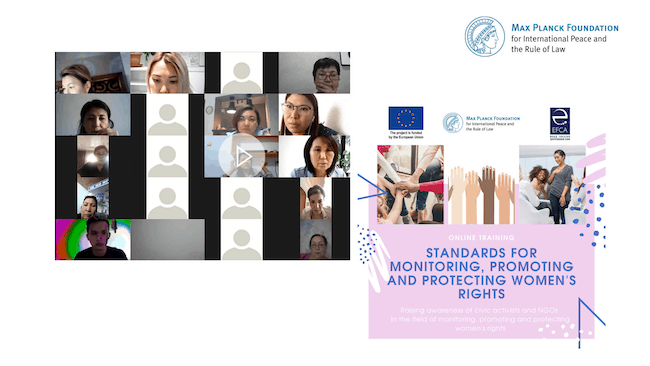The project team conducts a three-day training on monitoring, promotion and protection of women’s rights
The Max Planck Foundation in the framework of the EU-funded project “Fighting against discrimination of women from ethnic minorities and ensuring their equal access to public services” in the Kyrgyz Republic conducted a three-day online training, from August 26 to August 28, 2020, for more than 40 selected non-governmental and human rights organisations on the topic “Standards on Monitoring, Promotion and Protection of Women’s Rights”. Two invited local experts served as trainers during the event.
During the first day of a series of training, civil, political, social and other human rights were discussed. The experts covered such themes as diversity, freedom of choice, discrimination and inequality. The trainers gave a number of illustrative examples of inequality and stressed that the representatives of minorities and socially disadvantaged population groups are most often discriminated against. During the second part of the webinar, the experts discussed the international and national standards on women’s rights. Gender equality in governance was one of the topics addressed during the event. An infographic map of women in parliaments of selected countries was presented and discussed. The experts argued that in countries with a higher percentage of women in parliament, the level of corruption is lower. Finally, the experts discussed the strategy of lobbying and advocacy for women’s rights.
On the second day, the experts organised a session on state mechanisms for the protection of women’s rights, addressing the roles of the prosecutor’s office, courts, law enforcement agencies and the Ministry of Justice. The experts equally discussed the possibility of obtaining state-guaranteed legal aid. During the second part of the training, other means to protect the rights of women from ethnic minorities were discussed. The experts provided some insights from comparative experience of several states. The main topic during the last day of the training was monitoring and evaluation. The experts spoke about the monitoring and evaluation mechanisms and indicators. By way of example, the experts and the participants discussed the ways of measuring the implementation of laws that protect women from early marriages and violence.

